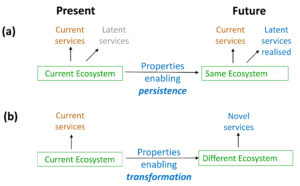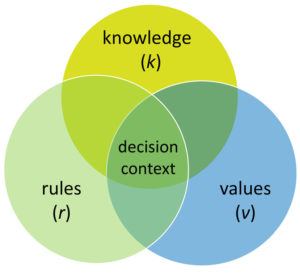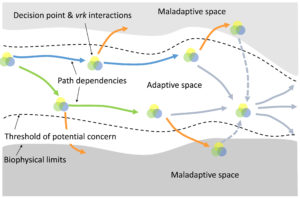Core concepts
The background to the formation of TARA grew from concepts developed by the CSIRO Enabling Adaptation Pathways (EAP) project. Putting these concepts together and finding ways to make them operational forms the basis of the EAP-TARA framework.
The first concept concerns the limitations of standard ecosystem services approaches, based on valuation and trade-offs, in planning for climate adaptation. We developed the concept of adaptation services (also referred to as ‘nature’s contribution to adaptation’). These are the benefits from ecosystems provided to people help them adapt to environmental change. The adaptation services concept stresses option and insurance values of ecosystems, which have tended to be downplayed in the theory and application of ecosystem services.

(a) Ecosystems that persist have properties that enable that persistence, allowing future supply of current ecosystem services, and also currently ‘latent’ services that may be used in the future. (b) Ecosystems that transform have properties that enable that transformation and also the supply of novel services that help people adapt
The second concept is based on the premise that successful adaptation requires changes in the systems of societal values, rules and knowledge (VRK). These systems shape the context for decision-making about adaptation. Changing the decision context for adaptation is a fundamental part of a transformative approach.

Focus on the decision context:
Do we know the outcome? (k)
Do we want the outcome? (v)
Are we allowed the outcome? (r)
The third concept is the use of adaptation pathways as a basis for robust, adaptive decision-making under conditions of high uncertainty. The adaptation pathways approach allows for sequencing of adaptation decisions and actions, revealing trajectories of change, identifying actions that may prove maladaptive and providing a means to enable experimentation, co-production and learning.

Social-ecological systems and deliberative change – the adaptation pathways metaphor
The interaction between these core concepts can help bridge the gap between science, policy and management and provide an operational framework to enable reflexive practice. The integration of these thee core concepts forms the basis of the TARA approach, a research framework to enable transformative adaptation.
For more information:
Colloff MJ, Gorddard R, Abel N, Locatelli B, Wyborn C, Butler JRA, Lavorel S, van Kerkhoff L, Meharg S, Múnera-Roldán C, Bruley E, Fedele G, Wise RM, Dunlop M (2021) Adapting transformation and transforming adaptation to climate change using a pathways approach. Environmental Science and Policy 124, 163–174. https://doi.org/10.1016/j.envsci.2021.06.014
Palomo N, Locatelli B, Otero I, Colloff MJ, Crouzat E, Cuni-Sanchez A, Gómez-Baggethun E, Grêt-Regamey A, Jiminez-Aceituno A, Martín-López B, Pascual U, Zafra-Calvo N, Bruley E, González-Garcia A, Fischborn M, Metz R, Lavorel S (2021) Assessing Nature-based Solutions for transformative change. One Earth 4(5), 730–741. https://doi.org/10.1016/j.oneear.2021.04.013
Colloff, M.J., Wise, R.M., Palomo, I., Lavorel, S., Pascual, U. (2020) Nature’s contribution to adaptation: insights from examples of the transformation of social-ecological systems. Ecosystems and People 16, 137–150. https://doi.org/10.1080/26395916.2020.1754919
Colloff, M.J., Doody, T.M., Overton, I.C., Dalton, J. and Welling R. (2019) Re-framing the decision context over trade-offs among ecosystem services and wellbeing in a major river basin where water resources are highly contested. Sustainability Science 14, 713–731. http://dx.doi.org/10.1007/s11625-018-0630-x
Colloff, M.J., Gorddard, R. and Dunlop, M. (2018) The values-rules-knowledge framework in adaptation decision-making: a primer. CSIRO Land and Water, Canberra. http://dx.doi.org/10.13140/RG.2.2.13783.11688/2
Fedele, G., Locatelli, B., Djoudi, H. and Colloff, M.J. (2018) Reducing risks by transforming landscapes: cross-scale effects of land-use changes on ecosystem services. PloS One 13(4), e0195895. https://doi.org/10.1371/journal.pone.0195895
Colloff, M.J., Martín-López, B., Lavorel, S., Locatelli, B., Gorddard, R., Longaretti, P.-Y., Walters, G., van Kerkhoff, L., Wyborn, C., Coreau, A., Wise, R.M., Dunlop, M., Degeorges, P., Grantham, H., Overton, I.C., Williams, R., Doherty, M., Capon, T., Sanderson, T. and Murphy, H.T. (2017) An integrative research framework for enabling transformative adaptation. Environmental Science and Policy 68, 87-96. http://dx.doi.org/10.1016/j.envsci.2016.11.007
Colloff, M.J., Lavorel, S., Wise, R.M., Dunlop, M., Overton, I.C. and Williams, K.J. (2016) Adaptation services of floodplains and wetlands under transformational climate change. Ecological Applications 26, 1003-1017. http://dx.doi.org/10.1890/15-0848
Gorddard, R., Colloff, M.J., Wise, R.M., Ware, D. and Dunlop, M. (2016) Values, rules and knowledge: adaptation as change in the decision context. Environmental Science and Policy 57, 60-69. http://dx.doi.org/10.1016/j.envsci.2015.12.004
